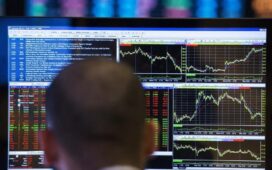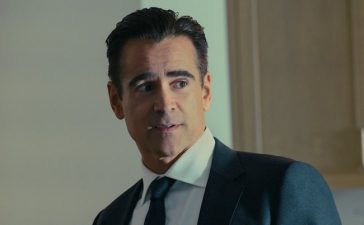BoE’s Bailey: We expect recession will be very small
Q: So, now inflation is down to 4%, and forecast to hit 2%, and the economy is in recession, what would it take for you to cut interest rates now? What indicators do you want to see?
Andrew Bailey tells MPs that the Bank expects inflation to fall to its 2% this spring, but he warns that it wonât stay there â as the inflation rate is being moved by changes in energy prices which wonât be permanent.
The Bank, thus, expects inflation to pick up by the end of this year (as it forecast earlier this month).
Bailey says monetary policy has been restrictive in the run-up to the current recession, but also points out that supply side growth has been unusually weak in the period (a hint that the Bank wonât take all the blame for the recession).
Bailey also points out that Britain is at âfull employmentâ, which is a âvery good storyâ.
And he tells the Treasury committee that the Bank expects it will only be âa very small recessionâ, adding;
We think the economy is already showing distinct signs of an upturn.
[Reminder, the economy shrank by 0.3% in October-December, after a 0.1% contraction in July-September].
He adds that the Bank wants to see sign that inflation persistence easing. So it will look at services prices, pay rises, and âquantities in the labour marketâ, when assessing when interest rates could be cut.
Key events
Todayâs session ends with Andrew Bailey hinting that he expects interest rates to cut this year.
He tells MPs that around 70% of the Bankâs previous interest rate increases have fed through to the economy, meaning 30% is yet to come.
Bailey then explains that he is âcomfortableâ with a market profile for UK interest rates that has cuts in it.
But, he insists, that is not a commitment to saying when it will happen, or how much easing there will be.
On that last point⦠deputy governor Ben Broadbent says some companies are doing âlabour hoardingâ.
Theyâre holding onto staff, even though activity has fallen, because they expect growth to pick-up so donât want the hassle of having to rehire staff.
Q: Is the Bank worried that GDP-per-capita has fallen for the last seven quarters? That suggests what little growth weâve seen has come from migration, which the government is trying to restrict
Bailey says there is strong employment in the economy, but low activity growth â in that set-up, GDP-per-capita is inevitably not going to look good.
Technical note: GDP-per-head either fell or was flat for the last seven quarters, the worst run on record:
Two quarters of contraction of real GDP will get headlines, but maybe this is the real story ð
ð¥ GDP per person dropped every quarter of 2023. It hasn’t grown since Q1 2022
ð¥ That’s 7 quarters – longest unbroken run without per capita GDP growth since records began in 1955 pic.twitter.com/bknjT5TlMy— Andy Bruce (@BruceReuters) February 15, 2024
Governor Andrew Bailey goes on to bat aside criticism of the Bank of England from Jacob Rees-Mogg.
Rees-Mogg has recently pronounced that BoE independence is part of the problem, Labour MP Angela Eagle tells Bailey.
Q: To what extent do you think undermining the institutional structures that have been in place since the late-1990s is helpful?
Bailey replies that he is a âvery strong advocate and defenderâ of the central bankâs independence.
Bailey says it has helped in the currrent period of inflation.
Q: Will UK interest rates have to rise again, if gobal events create persistent inflationary pressure again?
The Bank policymakers explain that such shocks create a trade-off between inflation and activity, so theyâd need to judge that balance, when deciding how to react.
The Treasury committee also probe the impact of global shocks on the UK economy
Danny Kruger MP fears that the Bank risks âchoking offâ the recovery unless it cuts interest rates soon.
Q: Should we be more worried about the Red Sea crisis? And are algorythmic traders distorting the energy market?
Andrew Bailey points out that gas storage levels remain relatively high, as the UK exits winter, which is a good sign for future prices.
The weather has dealt us âan enormous benefitâ, Bailey explains.
UK and European gas prices hit eight-month low yesterday, while US natural gas prices have plunged to a near-three-decade low
[That benefit, though, has also brought a worrying number of heat record on land and in oceans, due to human-made global heating and the El Niño effect].
On the Red Sea, Bailey says the Suez Canal is used more for goods transport than for energy, so the rise in shipping costs may not effect oil and gas prices as much as for goods.
And the BoE governor denies being sanguine about the issue of the Middle East. These terrible events are a real risk, he insists.
Bailey: We are not seeking a recession
Q: Does the Bank see a recession as a ânecessary evilâ in getting inflation down in the long term?
âWeâre not seeking a recession, definitely not.â Andrew Bailey insists, adding:
âWe donât target growth, we target inflationâ.
Bailey: tax cuts aren’t necessarily inflationary
Labour MP Keir Mather turns to fiscal mattersâ¦
Q: Is the Bank anticipating tax cuts in the budget?
Andrew Bailey says the Bank never anticipates fiscal changes â it models them after it happens.
Q: But have you a view whether the tax cuts being reported could be inflationary?
Bailey says the Bankâs view is that the tax cuts in the autumn statement will have a positive effect on GDP, but wonât have much effect on inflation at all.
Thatâs because measures such as lowering national insurance should help the supply side of the economy; by encouraging people into the labour market.
Q: You also donât know when the election will beâ¦.
I was hoping someone would tell us, Bailey jokes.
âBefore next Februaryâ, someone chips in helpfully.
Q: .. are MPC members holding off cutting rates because of tax cuts in the budget are a âknown unknownâ?
Thatâs âvery definitely not part of our thought processâ, governor Bailey insists, saying the Bank doesnât anticipate fiscal events or the election.
Broadbent: Interest rate risks are both ways….
Ben Broadbent brushes aside the notion that the Bank is being too tardy to cut rates, despite the pain being felt in the economy by households and businesses.
Asked about the risk that interest rates are overly restrictive, Broadbent points to the split at the MPC this month.
Clearly thereâs a risk, but thereâs also a risk that theyâre not sufficiently.
There were two of us who voted for still higher interest rates.
Broadbent also disputes the claim that all the evidence is for a cut now.
In my experience, and Iâve been doing this quite a while now, it is never the case that every lead indicator points in the same direction.
Broadbent does agree that thereâs been good progress in easing inflation. But a lot of the disinflation has been the unwinding of pandemic effects, such as on goods prices.
Services inflation and wage inflation, though, are running over 6%, Broadbent adds, which is roughly double where the Bank thinks they should be to achieve price stability.
But⦠MPC dove Swati Dhingra points out that keeping rates high for too long runs the risk of a hard landing, and the risk of damaging the supply capacity of the economy (which is why she voted to cut rates this month).
Andrew Bailey then denies that the Bank is âbehind the curveâ on shifting towards cutting interest rates.
He says the Bankâs position has moved; it is now focused on how long rates must stay at their current levels, rather than mulling further rate rises.
MPC member Megan Greene flags the risk of cutting interest rates too early, only to see inflation take off again, forcing the Bank to tighten again.
(This is a lesson she learned growing up in the US in the 1980s, when Paul Volcker forced inflation out by keeping interest rates high, after the volatility of the 1970s).
MP: The lights are flashing red for rate cuts
John Baron MP demands to know why the Bank arenât cutting interest rates now, when the economic warning lights are âflashing redâ.
Baron cites âvery pedestrian growthâ in the labour market, CPI inflation trending downwards, an easing in the labour market, and a deceleration of retail goods prices.
BoE governor Andrew Bailey reminds the committee that inflation is not forecast to be as low as 2% (its target) at the end of the year, so the question is how long must policy remain restrictive.
âWeâre not there yet,â (able to cut interest rates) Bailey adds.
Thérèse Coffey suggests the Bank is being held back by groupthink on its Monetary Policy Committee.
Q: The internal members of the MPC seem to vote en bloc â would it be better to just have one collective vote from those members?
Currently, each of the nine members gets one vote each â there are five internal members, and four external experts.
Bailey insists the MPC are very independently minded, and points out that around 25% of MPC meetings in the last two years have seen a split among the executive (internal) members.










